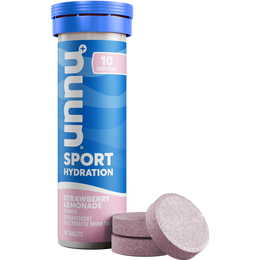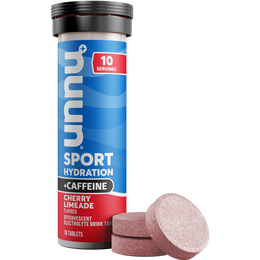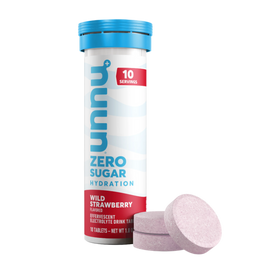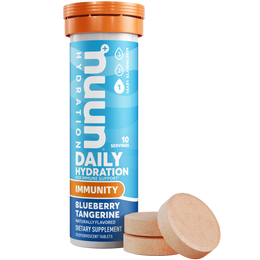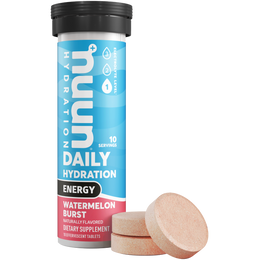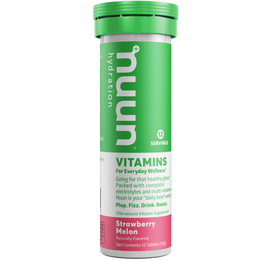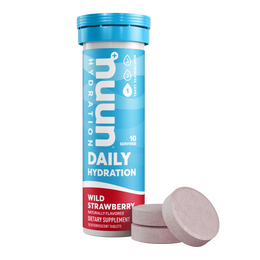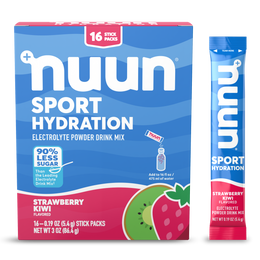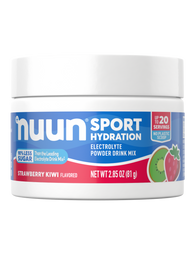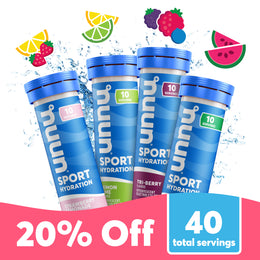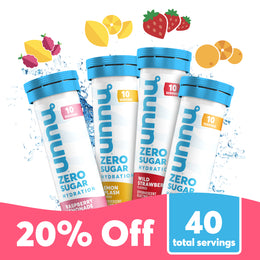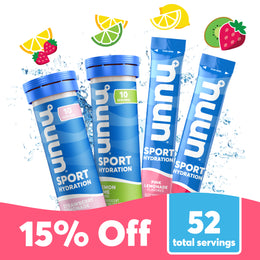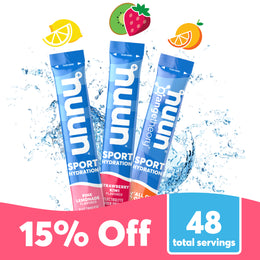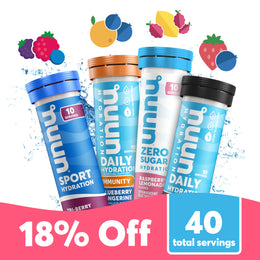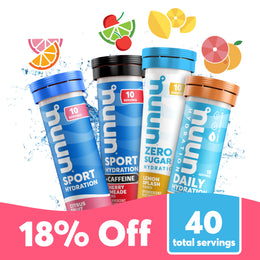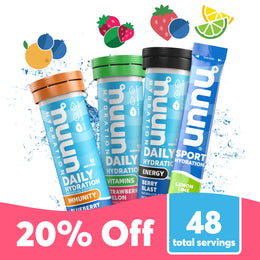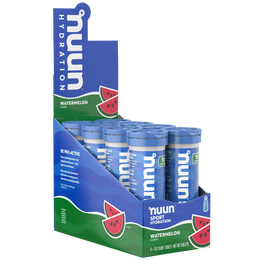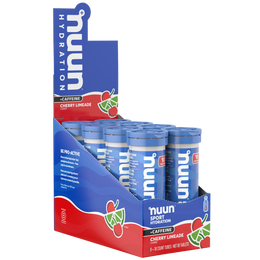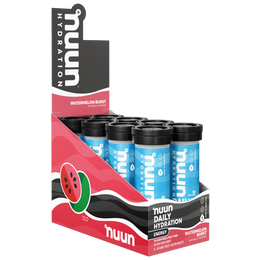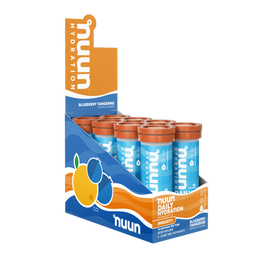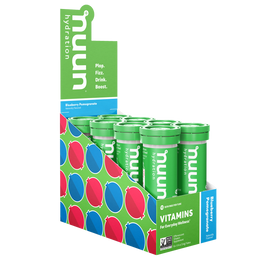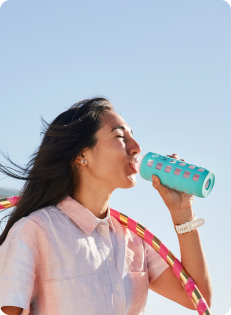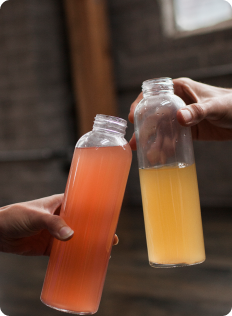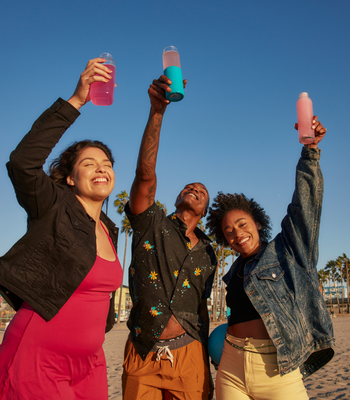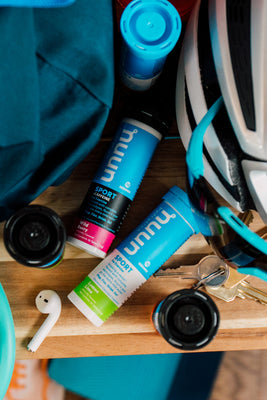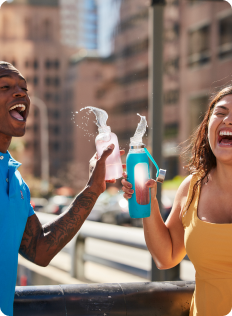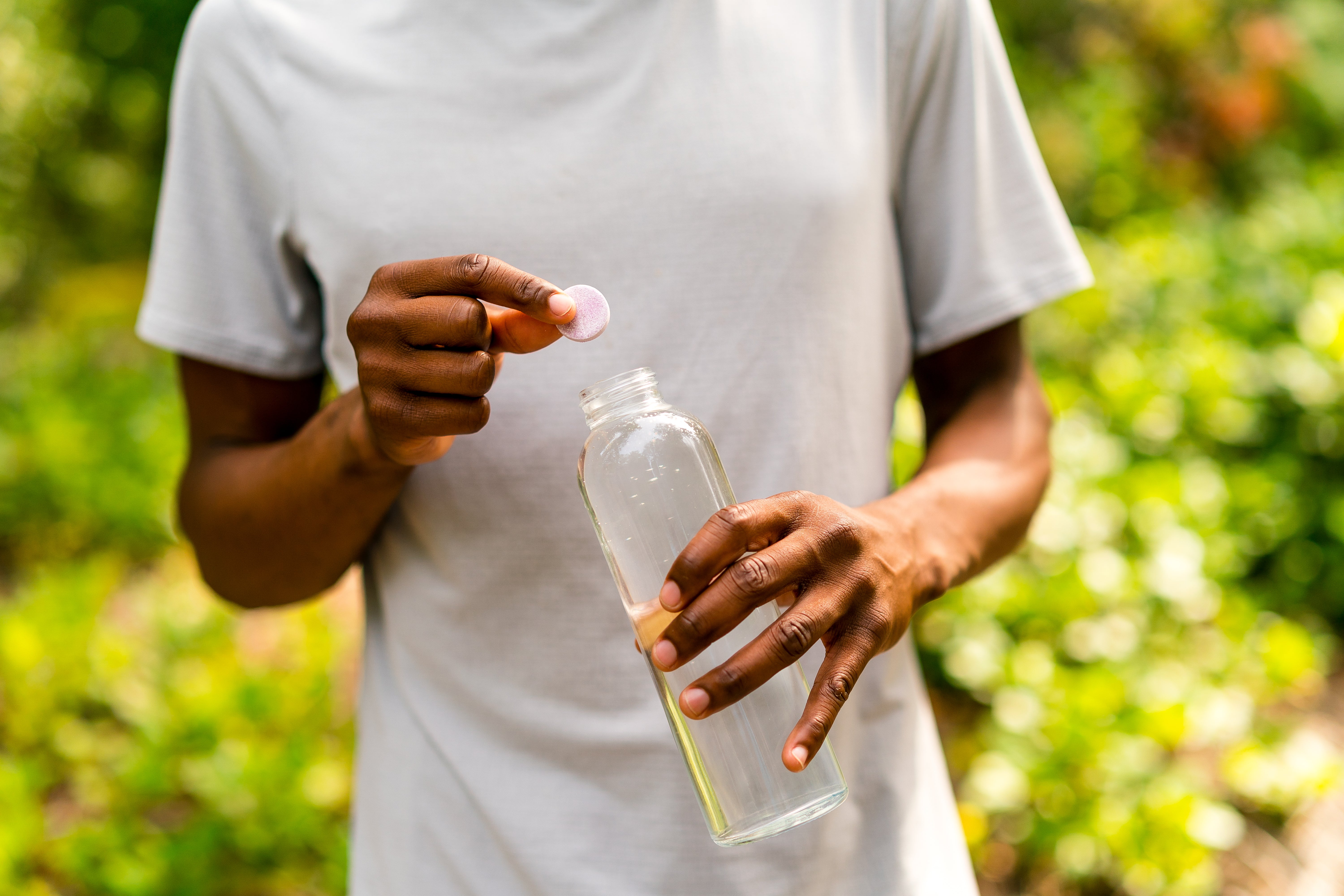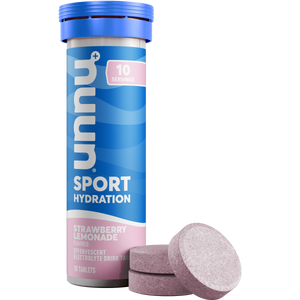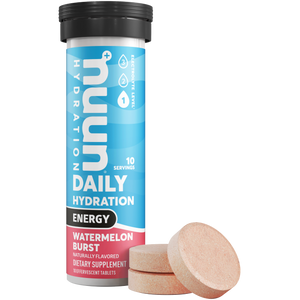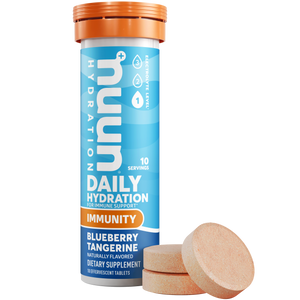Quick Facts
- What are electrolytes? Minerals like sodium, potassium, calcium, and magnesium that regulate fluid balance and nerve/muscle function.
- Why are they important? They help your body absorb and retain water, prevent cramps, and maintain energy levels.
- Daily needs: Most adults need around 1,500–2,300 mg sodium, 4,700 mg potassium, 1,000 mg calcium, and 300–400 mg magnesium per day.
- When do you lose electrolytes? Heavy sweating, long workouts, illness, and hot weather can cause rapid electrolyte loss.
- How to replenish: Balanced meals help, but electrolyte drinks like Nuun provide an easy way to restore minerals during and after activity.
What are electrolytes?
Electrolytes are tiny particles that carry electrical charges. They serve many roles to help the body maintain proper function. When you sweat, electrolytes play key roles in keeping water balanced both inside & outside of cells so that your muscles and organs can continue to serve you properly.
Electrolytes can help:
- Regulate chemical reactions
- Conduct electrical charges to help muscles contract
- Maintain the balance between fluids in and outside of your cells
Why do electrolytes matter for hydration?
When you sweat, your body loses both fluid and electrolytes. If you don’t begin your workout properly hydrated, and/or you aren’t hydrated properly during your activity, dehydration can occur through the act of sweating. Everyday life calls for everyday electrolytes. Staying hydrated through your workday or daily to-do list is important too!
What happens if you get dehydrated?
Dehydration has several negative impacts like:
- Fatigue
- Headaches
- Low blood sugar
- Dry mouth and mucous membranes (lips, gums, nostrils)
But even if you don’t feel a difference, as little as 2% dehydration can result in a decrease in performance. Remember, thirst is the #1 indicator that you may be dehydrated.
Replenishing electrolytes via a sports drink helps to replenish your mineral losses, but electrolytes also help make the most of your water, which is the key to proper hydration. Sports drinks high in sodium, potassium, magnesium, and calcium can help retain fluids, and proper fluid balance contributes to optimal performance.
Sodium (Na)
Sodium is the most important electrolyte to monitor during training. Excessive losses of sodium (via sweat) can lead to muscle cramps, and in some cases hyponatremia (low blood sodium) – both can lead to a decrease in performance and can cause major health complications (2).
Sodium maintains fluid balance in the body
Sodium is critical for maintaining fluid balance, nerve function, muscle contractions, and acid-base balance (2). Sodium losses in sweat are greater than any other electrolyte. Therefore, it is crucial to maintain an adequate balance, both during your activity and after.
Potassium (K) – prevents cramping
Potassium is abundant in many food sources, and the average individual has high stores within the body. In sweat, potassium losses are not as high as sodium. Therefore, making it highly unlikely that losses in potassium (alone) can cause a decrease in performance. With that said, it is still crucial to maintain potassium levels while training, as it will be critical for a healthy water & electrolyte balance.
Potassium helps prevent cramping
Potassium, in conjunction with sodium, helps alleviate and prevent muscle cramps (2). It’s also necessary to help regulate the function of your heart.
Calcium (Ca)
Calcium is the most abundant mineral in the body (2). It serves many roles both in normal bodily functions, and athletic performance. When calcium is circulating within the bloodstream, it has a major impact on the metabolism of essential nutrients, and proper physiological functions.
Calcium regulates muscle contractions and heart rhythm
It is well documented that calcium is essential for bone and muscle health, but this electrolyte is also involved in the transmission of nerve signals and in all types of muscle (heart, skeletal, and smooth) functions and contractions. It’s also involved in the synthesis and breakdown of muscle and liver glycogen (fuel stores).
Magnesium (Mg)
This electrolyte helps your cells as they turn the nutrients you eat into energy (a process called glucose metabolism); your brain, nerves, and muscles require magnesium in order to work properly.
Magnesium relaxes muscles
Similar to how sodium and potassium function together, magnesium and calcium do the same. Calcium is essential for muscle contractions; magnesium aids in helping muscles relax (1). Therefore, the combination of magnesium and calcium is critical for healthy muscle function.
Chloride (Cl)
This abundant ion plays a role in maintaining the body’s pH balance, preventing it from becoming too acidic or too alkaline.
Chloride balances fluids
This electrolyte is needed to help your cells maintain the balance of internal and external fluids. This regulation of fluid volume supports healthy blood pressure. It works in conjunction with sodium and potassium to ensure proper electrical conductivity in the body.
How do I lose electrolytes?
Several factors come into play when determining electrolyte losses, such as: fitness level, activity duration, and environmental factors. During conditions in which both temperatures and humidity are high, the body works harder, thus increasing internal body temperature (thermoregulation). With this increase, the body needs to release heat (through sweat), and electrolytes can be lost at a greater rate. During strenuous activities in which sweat rates may be greater, or the duration is longer, it is essential to replace electrolytes by drinking fluids, and be aware of signs of dehydration.
How do I know if I need to replace electrolytes?
An electrolyte imbalance happens when certain mineral levels in your body become too low or too high due to fluctuating fluid levels in your body. If you’ve been working in the yard on a hot day and have been sweating profusely, not only will you need to rehydrate, but you may also need to replace vital electrolytes.
Some signs that you’re experiencing an electrolyte imbalance include:
- Confusion and irritability
- Fatigue
- Headache
- Irregular heart rate
- Muscle cramps or spasms
- Numbness and tingling in extremities
Are there daily electrolyte requirements?
Daily requirements for these minerals vary by gender, age, and in some cases, fitness activity level/duration. The Institute Of Medicine (IOM) has set standards for each of these minerals (4).
| Electrolyte | Recommended Amount | Notable Information |
|---|---|---|
| Sodium | 1500 mg per day for most adults | Safe upper limit is around 2300 mg per day. |
| Potassium | 4700 mg per day for men and women | |
| Calcium | 1000 mg per day for most adults | Men and women over 70 should increase intake to 1200 mg/day. |
| Magnesium | 310-320 mg/day for adult women 400-420 mg/day for adult men |
|
| Chloride | 2300 mg/day for most adults |
What’s the best way to get the electrolytes needed for hydration?
For those who need to rehydrate and replace electrolytes lost during sweat, an electrolyte drink may be the way to go. Another option is a hydration drink mix like Nuun Daily tablets. These effervescent tablets are great for daily use and contain zero sugar! For those who lead a more active lifestyle, try Nuun Sport tablets! Each tablet contains optimized levels of the electrolytes you need to maintain your bodily functions and proper hydration:
- Sodium – controls fluid levels and helps nerve and muscle function
- Chloride – helps maintain blood levels, blood pressure, and bodily fluids
- Potassium – supports muscle and nerve function
- Magnesium – helps muscles to relax and aids in the metabolism of nutrients
- Calcium – stabilizes blood pressure and helps the nervous system send information
The bottom line on electrolytes and hydration
Electrolytes are the unsung heroes behind effective hydration; they’re the minerals that help regulate fluid balance, support muscle and nerve function, and keep you performing your best. Maintaining the right levels of sodium, potassium, calcium, and magnesium is especially vital during exercise or in hot conditions when sweat causes accelerated losses. While everyday diets can often meet these needs, strategic replenishment through electrolyte-rich beverages can help you rehydrate quickly.
By choosing a well-balanced hydration solution—like Nuun’s clean, easily digestible electrolyte mix—you not only support your body's hydration systems but also enhance performance, reduce fatigue, and recover smarter.
Additional resources
- Clark, N. (2008). Sports Nutrition Guidebook. 4th Ed., Champaign, Il: Human Kinetics.
- Ryan, M. (2012). Sports Nutrition for Endurance Athletes. 3rd Ed. Boulder, Co: Velopress
- Fink, H.H, Burgoon, L.A, Mikesky, A.E. (2009). Practical Applications in Sports Nutrition.
2nd Ed., Pp 220-254. Sudbury, Ma: Jones and Bartlett Publishers, LLC.
